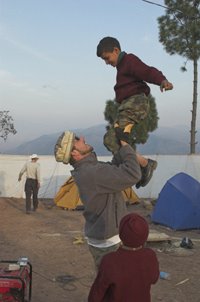Seeking peace in Pakistan
Relief volunteers, including many from Lancaster County, visit the earthquake-hit country and work alongside the "remarkably resilient" residents.
By JOAN KERN, New Era Staff Writer
Reality did not match perception for some Americans and Pakistanis when they met in the earthquake-ravaged mountains of northern Pakistan.
Americans from historic peace churches -- many of whom were Lancaster County residents -- thought they were going to a dangerous country with many Muslim fundamentalists and terrorists.
Instead, they found hospitable, peace-loving people who want nothing to do with terrorists.
"(They) want peace as much or more than we do," said Jon Unger Brandt. "They were very open and warm to Christians, with no love for terrorism."
Unger Brandt, 35, of Lancaster, was among 39 volunteers on a relief mission last month organized by Salunga's Eastern Mennonite Missions, an Anabaptist global mission agency.
As for the English-speaking Pakistanis he met, "it's not their perception that American Christians are peace loving. They do not understand what we are doing in Iraq," he said, referring to the ongoing war.
The Americans worked hard, helping residents prepare to rebuild after the Oct. 8 earthquake that killed 87,000 people and left 3.5 million homeless.
But Unger Brandt said the more significant aspect of the visit was to offer the Pakistanis hope and show them that "there are American Christians who care and want to help globally.
"It was good to sit and have tea with them and share that I want peace as much as they do," he said.
Unger Brandt, EMM's communications director, is a member of Blossom Hill Mennonite Church, which helped fund his trip to the mountains of Azad (or "free") Kashmir, an independent Pakistani territory.
The volunteers, ages 17 to 74, went in two teams, one from Dec. 6 to 20; the other, Dec. 11 to 25.
They included 70-year-old Dr. Clarence Rutt of Landisville, who worked in a medical clinic in Pakistan, and two local high school seniors, Joseph Mozloom of Hempfield and Derrick Musser of Donegal.
They flew into Islamabad, followed by a four-hour drive, most of it, Unger Brandt said, between a mountain wall and the "swiftly running" Jhelum River.
The last half-hour of the drive took them on a steep climb on a road with dangerous hairpin turns. The reward was breath-taking views of an area that a travel writer once described as "paradise on earth."
EMM arranged the relief mission with an international nongovernmental organization. But four days before departure, a representative from the NGO called and said, "We're swamped. Don't come."
With some last-minute scrambling, EMM made new arrangements with two Pakistani NGOs, allowing the Americans to work directly with earthquake survivors.
"One man I worked with lost his home, some family members and his business," said Unger Brandt, who worked at a field hospital and in the nearby village of Bugna.
Others worked in Balakof, where, in the old part of the city -- on the side of a steep mountain -- every building was destroyed.
Most of the casualties in the earthquake, which occurred on a weekday morning, were students in schools that collapsed.
"Within 30 seconds a three-story building was gone," Unger Brandt said. "I saw a women's college where 200 women died, a school where 300 children died.
"People talked of seeing children still alive, buried under rubble, that they couldn't get to," he added. "I don't know quite how to comprehend that. I think of my kids and don't want to imagine that happening."
He and his wife, Lori, have an infant and a toddler.
Unger Brandt said the relief workers were overwhelmed by the enormity of the disaster.
The original assignment with the international NGO was to help build temporary shelters to replace tents, then housing the victims, because the tents will not survive heavy snowfalls
(The relief workers camped in tents, too. They went prepared for the worst weather but were blessed with two weeks of sunny, warm days, with temperatures below freezing only at night.)
The local people, who he said were "remarkably resilient," weren't anywhere near ready to rebuild. Instead, relief workers worked alongside them, removing rubble.
"They were encouraged by people willing to come so far," Unger Brandt said. "They asked why we came, who paid us. They were struck that no one was paying us."
The challenge was to know where to begin when everywhere they looked was devastation.
"Who bands together to help whom when everyone needs help?" he asked.
The Americans went where they were told, knowing behind every family they helped stood 15 more that they would not get to reach.
"We left knowing we did some good, but if we went back in six months, there would still be a lot to do," he said. "It was a little bit daunting."

